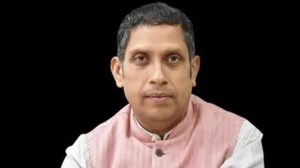Marching orders
TO the existing political chaos in the country, Uttar Pradesh may soon send its contribution. On February 25, Chief Minister Mulayam Singh Y...

TO the existing political chaos in the country, Uttar Pradesh may soon send its contribution. On February 25, Chief Minister Mulayam Singh Yadav shocked politicians by moving a 8216;confidence motion8217; in the UP Assembly. It exposed the political undercurrent: anything can happen in the state before or on March 10.
On that day, the Lucknow bench of the Allahabad High Court may decide on whether the 40 Bahujan Samaj Party MLAs, who had changed allegiance to the Samajwadi Party in 2003, come under the anti-defection law. If they are found guilty, it could well mean 8216;8216;an end8217;8217; to the one-and-a-half-year rule of the Mulayam Singh government. The Assembly elections in UP are due in 2006.
IT8217;S the March fear that led Mulayam to move a confidence motion on February 25. The BSP MLAs walked out and he had no difficulty in winning the motion through a voice vote.
Meanwhile, Advocate General Virendra Bhatia is busy putting before him all legal possibilities. The legal battle may go beyond March 10 but Mulayam is now already armed with the 8216;confidence motion8217;. The Opposition says 8220;he can use this to dissolve the Assembly8221; if he finds himself on weak legal ground before March 10. This would entitle him to continue as a 8216;caretaker8217; government till fresh elections. This means that his government will help of course under the Election Commission guidance make arrangements for the elections.
The rest have little time for remorse. Says Mehboob Ali, minister for state for minorities welfare: 8216;8216;The chief minister has kept his promise and has given something to everyone. Those not included in the first round, were taken in the second round.8217;8217;
IT was on January 6, 2005, that the Lucknow Bench of the Allahabad High Court admitted a writ against the 40 legislators under the anti-defection law. The writ was filed by the BSP Legislative Party leader Swami Prasad Maurya. Since then, the case has come up before the court at least six times.
| It8217;s the March fear that led Mulayam to move a confidence motion on February 25. BSP MLAs walked out and he won the motion through a voice vote |
The legislators are giving everyone some tense moments. On February 4, they failed to turn up in court to reply against the notices served on them. Says BSP8217;s legal advisor S C Mishra, 8216;8216;As no one appeared before the court with their replies, the case should now be decided ex parte.8217;8217;
The legislators8217; absence gave the BSP some cause for cheer. But they celebrated a bit prematurely though. As the BSP decided to move ahead with an application requesting the court to decide the case in favour of the petitioner on February 8, the defectors MLAs8217; legal expert came up with another twist to this winding story. He said they had never received the notices. The court has now demanded to know when and how these notices were served to the 40 MLAs.
- 01
- 02
- 03
- 04
- 05






























